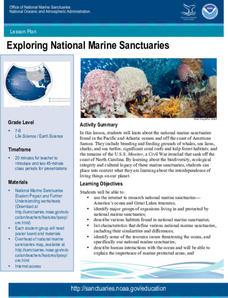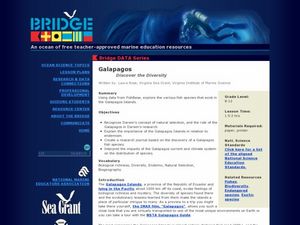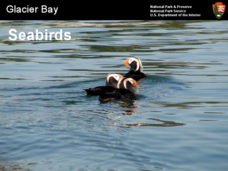Curated OER
National Marine Sanctuaries Fish
Information is provided on Gray's Reef, Florida Keys, and Flower Garden Banks marine sanctuaries. Young marine biologists then visit the FishBase and REEF databases to collect fish species information for each location. They then...
Curated OER
Marine Sanctuaries
Middle schoolers delve into diverse marine ecosystems and the problems they face. They discover students the national marine sanctuaries found in the Pacific and Atlantic oceans and off the coast of American Samoa.
American Museum of Natural History
Make Your Own Marine Biology Stationary
Encourage letter writing with marine biology-themed stationary. Three versions showcase a variety of underwater creatures.
Curated OER
A Lesson in Biodiversity: Making Comparisons Between Defensive Mechanisms Utilized by Marine Organisms
If your upper elementary or middle school marine biology learners are going to visit an aquarium, then here is a field trip activity guide for you. It is written specifically for The Maritime Aquarium, but the idea can be adapted to any...
NOAA
What Little Herc Saw
See the underwater world through a different pair of eyes! Middle school marine biologists identify deep-sea organisms by examining images taken by an ROV from the Okeanos Explorer. After determining what creatures lie beneath the...
Curated OER
The Census of Marine Life
Students explain diversity and abundance in marine life. In this oceanic biology lesson, students collect information for various geographical areas to collect a census of marine life.
Curated OER
Coral Snapshots
Using photographs and a coral reef identification key, junior marine biologists compare changes in coral cover for a No-Take Area and the surrounding unprotected area. The data that is collected is then analyzed for richness,...
Howard Hughes Medical Institute
Ocean Acidification
Human impacts on the environment can sometimes be difficult to measure, especially under water! An activity centered on ocean acidification gives science scholars the opportunity to examine the effects of carbon dioxide on marine life....
Curated OER
How Diverse is That?
Compare various types of biological diversity in a coral reef and calculate a numeric indicator that describes the diversity found in coral communities. Your class can work in groups to look at the abundance and distribution data of...
Curated OER
Biodiversity
Students explore the diversity of different marine sanctuaries. In this biodiversity lesson students work in groups to explore a sanctuary.
Curated OER
Exploring National Marine Sanctuaries
Middle schoolers conduct Internet research of the living organisms in national marine sanctuaries, and the resources protected in the sanctuaries. Students gather information about each of the sanctuaries and make an oral presentation...
Wilderness Classroom
Ocean Life
Our oceans are composed of many complex relationships. Young oceanographers explore relationships between organisms, understand the world ocean's currents, and discover the effects of water pollution and how it behaves. There are three...
Curated OER
Sea Connections: Marine Ecosystems
Students identify producers and consumers from marine ecosystems and describe the balance among them in the environments. After constructing a food chain from a marine ecosystem, they examine human activities that can upset the balance...
Curated OER
Let's go to the Video Tape!
Using actual data from a deep-sea video survey, high school marine biologists consider the biodiversity, compare species richness between two communities, and learn to calculate the diversity index. The lesson plan is all-inclusive,...
American Museum of Natural History
What do You Know About Life on Earth?
Humans have only inhabited the earth for a fraction of the time that life has existed. Young scientists explore the facts about the emergence of life on Earth with an interactive resource. While highlighting different types of life, the...
Curated OER
Big Fleas Have Little Fleas
A benthic habitat hosts a vast collection of organisms and its structure influences the biodiversity. Middle-school marine biology explorers will discuss how corals impact structure, and therefore diversity, on the ocean floor. They draw...
Curated OER
Biodiversity
Learners explore the biodiversity of the national marine sanctuaries. In this science lesson, students view a video about Cordell Bank National Marine Sanctuary and Hawaiian Islands Humpback Whale National Marine Sanctuary. Learners work...
Curated OER
Galapagos - Discover the Diversity
Pretend you are exploring a newly discovered species of fish in the Galapagos. Your budding marine biologists access FishBase Database's list of marine/brackish fishes and choose one to research. The link through this website does not...
Curated OER
Adaptation and Diversity on Sheffield Island
Written for an exploration of shoreline ecosystems on Sheffield Island, this gives ecology or marine biology buffs a hands-on experience. Using GPS or visual triangulation techniques, they lay transect lines on a high and a low energy...
Curated OER
Marine Protected Areas (MPA)
Ninth graders explain the purpose of MPA's. In this biology lesson, 9th graders identify MPA's in Southern California. They simulate coastal sampling using candy from two buckets. Students analyze their results and share it with the class.
Curated OER
Sea Connections
Students, after locating different marine habitats on a globe, play a card game about ecosystems, food webs and organisms.
Curated OER
Exploring the National Marine Sanctuaries: A Lesson in Habitats and Human Impacts
Students examine the marine sanctuaries in the Pacific and Atlantic Oceans. They discover the interdependence of all living things and work together in groups to create a poster about what they have discovered during the lesson. They...
Curated OER
Glacier Bay Seabirds
A gorgeous collection of photographs take viewers on a virtual tour or Glacier Bay National Park with a focus on the seabirds living in the area. Adaptations to the polar climate are highlighted, different species of birds are displayed,...
Curated OER
No Escape
Via four student handouts, marine biology learners examine the topography and circulation cell of the Fieberilng guyot. Then they examine the number of individual hydroids counted at each depth. Pupils use the information to relate water...

























